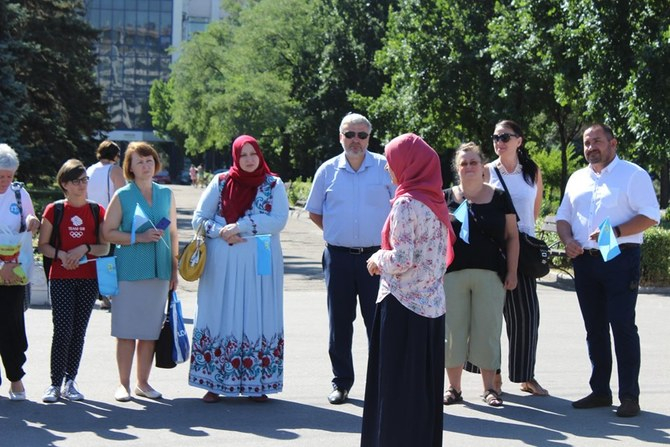Although Eid Al-Fitr is an Islamic festivity, a big part of its celebration is inspired, or at least partly derived from, local tradition. How Muslims mark the occasion differs according to geography.
Comprising only 1-2 percent of Ukraine’s population of almost 42 million, Muslims have created their own ways to celebrate Eid Al-Fitr.
Apart from attending the Eid prayer in the mosque of the Islamic Cultural Center in Kyiv, Olha Fryndak likes to decorate the house and buy her four kids gifts.
“For something homemade or cooked, we usually bake cakes. We’re used to this. If there’s a festivity then there’s cake,” Fryndak, head of the Ukrainian Muslimahs League, told Arab News.
Like Muslims in other regions, Ukrainians also like to gather with loved ones to mark the occasion.
“It could be the first or second day. We try to find a day that suits everyone because sometimes it (Eid) could fall on a working or school day,” Fryndak said.
As Ukraine is a secular country with a Christian Orthodox majority, not all Muslims get to take a day off work during the festivity.
On May 18, President Volodymyr Zelensky said he planned to sign a decree that would add Eid Al-Fitr and Eid Al-Adha to the state’s religious holidays.
When the celebration is during the warmer months, “we usually try to organize a picnic in the park or forest — barbeque, fruits, veggies,” Fryndak said.
Hundreds of kilometers away in the city of Dnipro, while on his way to visit Ukrainian Muslim soldiers in Donetsk, Evhen Hluschenko described how he and his family celebrate Eid.
“In our family, a small tradition was created were I always gift my wife some kind of sweets, like a special kind of sweets,” Hluschenko, an imam in the city of Kharkiv, told Arab News.
“Ukrainian Muslims are trying to create their own traditions for these festivities and for Ramadan,” he said.
“We’re embracing Islamic traditions in everyday life and behavior, but Islam doesn’t dictate any national traditions, which is why we’re trying to fill that vacuum.”
As this Eid he will be spending the first day visiting soldiers and away from his family, the imam had already hidden his wife’s gift so she could find it when the festivity starts.
Most Islamic countries determine the start of Ramadan and both Eids through special committees dedicated to sighting the moon.
“We have a special committee for fatwas (religious edicts). Imams and sheikhs with religious education, collectively according to the Islamic principle of shoura (consultation) decide on such pressing matters,” Ukraine’s Mufti Said Ismagilov told Arab News.
The Religious Administration of Muslims of Ukraine also follows the recommendations of Turkey, as it is geographically the closest Islamic country, as well as the European Council for Fatwa and Research, Ismagilov added.
Due to coronavirus regulations, Ukraine’s Muslims — like others worldwide — were unable to perform any Taraweeh prayers nor the Eid prayer in mosques.
“Nearly 4,000 Muslims gathered to perform Eid prayer” at the mosque of the Islamic Cultural Center in Kyiv before the spread of COVID-19, Ismagilov said.



